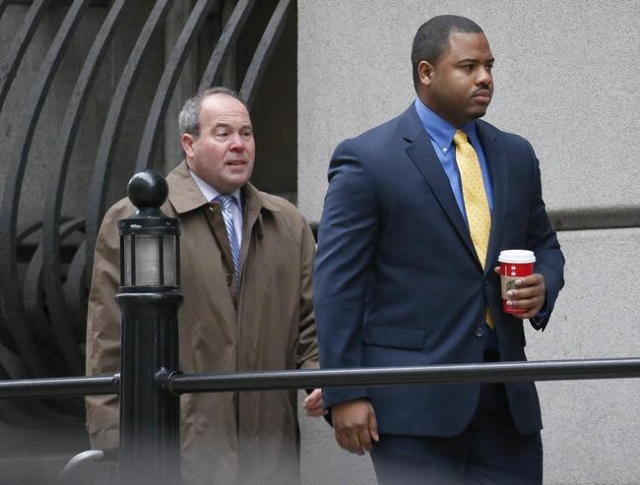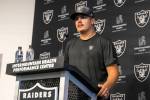Officer takes stand in his trial in Freddie Gray death
Baltimore police Officer William Porter, one of six officers charged in the April death of Freddie Gray, took the stand at his own trial Wednesday, and said there were no signs that Gray — eventually found to have broken his neck in a police van — needed immediate medical attention.
"I didn't call for a medic because after talking to Mr. Gray he was unable to give me a reason for any kind of medical emergency," Porter told the jury.
"I didn't see anything externally, cuts or wounds."
Asked if Gray said he couldn't breathe, Porter replied: "Absolutely not."
Prosecutors allege that Porter, summoned by the driver to check on Gray during a stop on the way to a police station, did not immediately call for a medic when Gray asked for help. They also allege that Porter, after seeing that Gray was not buckled in, did not get him into a seat belt as was department policy.
"This defendant did nothing to get him a medic or get him to the hospital. He did nothing when he could have saved a man's life," State's Attorney Michael Schatzow said in court Tuesday.
Gray's death a week after the injury sparked outrage and demonstrations, some of which were plagued by arson, vandalism and looting, despite his family's pleas for peace.
Porter, who joined the police department in 2010, testified that he used seat belts when transporting people in his cruiser, but never in the tight quarters of the wagon in which Gray sustained the fatal injuries.
Of the roughly 150 prisoners he put in police wagons during his time on the job, Porter said, none was strapped to a seat belt.
"It is the responsibility of the wagon driver to get the prisoner from point A to point B," he told the jury.
During his six weeks of field training, Porter testified, people transported in wagons were never strapped to seat belts. At the police academy, he said, cadets were told to use seat belts while transporting prisoners, but were not shown how to do so.
Porter said he received an electronic copy of general orders, through a flash drive.
"I never, ever had a physical copy of the general orders," he said.
Porter testified that he got to know police officers as a boy through his involvement with a police athletic league, where officers helped the young men with homework and attended field trips with them.
His mother is a nurse and his father served in the U.S Air Force, Porter told the jury. He said part of the reason he became a cop was to offer a positive view of officers.
Porter's testimony came after his attorneys called a forensic pathologist as their first witness. The prosecution rested a weeklong case Tuesday in the death of Gray, who authorities said broke his neck while being transported in a police van, shackled but not wearing a seat belt.
Porter has pleaded not guilty to charges of involuntary manslaughter, second-degree assault, misconduct in office and reckless endangerment.
Gray's April 12 arrest in Baltimore was captured in bystander videos. Prosecutors said Porter, 26, was present for all but one of six stops on Gray's 45-minute ride to the Western Division police station.
It remains unclear exactly how Gray was injured, but Dr. Carol Allan, the assistant state medical examiner, testified Monday that Gray probably received his neck injury between the van's second and fourth stops.
Although there is conflicting testimony about when, witnesses said Gray complained at least once of being unable to breathe. Gray asked Porter for medical assistance when the officer checked on him at the fourth stop, according to Allan's testimony and Porter's interview with department investigators. Allan said Gray probably was injured when the van stopped suddenly.
The delay in getting Gray medical attention led Allan to classify Gray's death as a homicide.
"If he had gotten prompt medical attention, it would not have been a homicide," she stated, adding that Gray probably would have survived if van driver Caesar Goodson had rushed him straight to a hospital when he told Porter "I can't breathe."
On Wednesday, Dr. Vincent Di Maio, a forensic pathologist testifying for the defense, said Gray's death should have been declared an accident and that the fatal injuries likely occurred during later stops on the police wagon.
"It was just an accident and accidents happen," he said.
Di Maio said he believes Gray suffered a "single catastrophic event" between the fifth and sixth stops — not between the second and fourth, as the prosecution claims — that left him paralyzed and unable to speak.
"This was a high energy event," he said.
"His head had to hit one of the the doors or the wall in the van with such force and if you do that you are going get a concussion."
Jury selection began on Nov. 30, and the state called its first witness two days later. The Porter case is expected to end by Dec. 17.




























